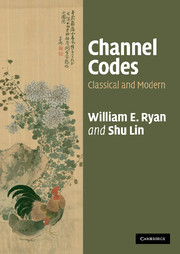Book contents
- Frontmatter
- Contents
- Preface
- 1 Coding and Capacity
- 2 Finite Fields, Vector Spaces, Finite Geometries, and Graphs
- 3 Linear Block Codes
- 4 Convolutional Codes
- 5 Low-Density Parity-Check Codes
- 6 Computer-Based Design of LDPC Codes
- 7 Turbo Codes
- 8 Ensemble Enumerators for Turbo and LDPC Codes
- 9 Ensemble Decoding Thresholds for LDPC and Turbo Codes
- 10 Finite-Geometry LDPC Codes
- 11 Constructions of LDPC Codes Based on Finite Fields
- 12 LDPC Codes Based on Combinatorial Designs, Graphs, and Superposition
- 13 LDPC Codes for Binary Erasure Channels
- 14 Nonbinary LDPC Codes
- 15 LDPC Code Applications and Advanced Topics
- Index
8 - Ensemble Enumerators for Turbo and LDPC Codes
Published online by Cambridge University Press: 05 June 2012
- Frontmatter
- Contents
- Preface
- 1 Coding and Capacity
- 2 Finite Fields, Vector Spaces, Finite Geometries, and Graphs
- 3 Linear Block Codes
- 4 Convolutional Codes
- 5 Low-Density Parity-Check Codes
- 6 Computer-Based Design of LDPC Codes
- 7 Turbo Codes
- 8 Ensemble Enumerators for Turbo and LDPC Codes
- 9 Ensemble Decoding Thresholds for LDPC and Turbo Codes
- 10 Finite-Geometry LDPC Codes
- 11 Constructions of LDPC Codes Based on Finite Fields
- 12 LDPC Codes Based on Combinatorial Designs, Graphs, and Superposition
- 13 LDPC Codes for Binary Erasure Channels
- 14 Nonbinary LDPC Codes
- 15 LDPC Code Applications and Advanced Topics
- Index
Summary
Weight enumerators or weight-enumerating functions are polynomials that represent in a compact way the input and/or output weight characteristics of the encoder for a code. The utility of weight enumerators is that they allow us to easily estimate, via the union bound, the performance of a maximum-likelihood (ML) decoder for the code. Given that turbo and LDPC codes employ suboptimal iterative decoders this may appear meaningless, but it is actually quite sensible for at least two reasons. One reason is that knowledge of ML-decoder performance bounds allows us to weed out weak codes. That is, if a code performs poorly for the ML decoder, we can expect it to perform poorly for an iterative decoder. Another reason for the ML-decoder approach is that the performance of an iterative decoder is generally approximately equal to that of its counterpart ML decoder, at least over a restricted range of SNRs. We saw this in Chapter 7 and we will see it again in Figure 8.5 in this chapter.
Another drawback to the union-bound/ML-decoder approach is that the bound diverges in the low-SNR region, which is precisely the region of interest when one is attempting to design codes that perform very close to the capacity limit. Thus, when attempting to design codes that are simultaneously effective in the floor region (high SNRs) and the waterfall region (low SNRs), the techniques introduced in this chapter should be supplemented with the techniques in the next chapter which are applicable to the low-SNR region.
- Type
- Chapter
- Information
- Channel CodesClassical and Modern, pp. 339 - 387Publisher: Cambridge University PressPrint publication year: 2009



